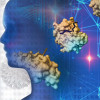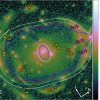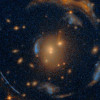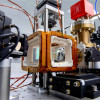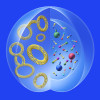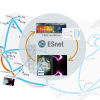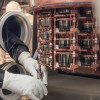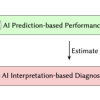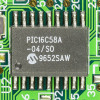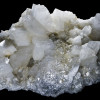Science News
AI Shows Promise for Mapping Disease Progression
With help from NERSC’s Perlmutter supercomputer, researchers have proposed a framework for investigating “embeddings,” representations of objects like text designed to be consumed by AI models such as large language models (LLMs). Read More »
Perlmutter Helps Identify 'Exquisite' Gravitational Lens
Using the Perlmutter supercomputer at NERSC, an abundance of new data from the DESI Legacy Imaging Surveys, and recent observations from NASA’s Hubble Space Telescope, researchers from the University of California, Los Angeles, Berkeley Lab, and collaborating institutions have identified a unique configuration of seven galaxies forming the most exquisitely aligned gravitational lens ever discovered. Read More »
Magnifying Deep Space Through the 'Carousel Lens'
An unprecedented discovery by the DESI collaboration has generated a computational model with promise for measuring elusive cosmic parameters like dark matter and dark energy. Read More »
Collaboration Exploring Neutral Atom Technology Expanded for Second Year
NERSC has teamed up with the Boston-based quantum computing company QuEra Computing, exploring an up-and-coming approach to quantum computing known as neutral atom technology. After a successful first year punctuated with strong scientific results, the partnership has been extended. Read More »
Tropical Cyclones Intensifying Due to Warming Atmosphere
Using computational resources at NERSC, researchers from Pacific Northwest National Laboratory, Berkeley Lab, and partnering institutions have gained a better understanding of how tropical cyclones near coastal regions have intensified over time, the likely causes of the change, and what the future might hold according to climate models. Read More »
Gravitational Form Factors Illuminate Substructure of the Proton
Using simulations performed on NERSC’s Perlmutter system, a team of researchers used lattice quantum chromodynamics (lattice QCD) to understand for the first time certain aspects of how quarks and gluons form the structure of the proton. Read More »
QIS@Perlmutter Fuels Discoveries and Collaborations in Quantum Computing
Since its launch in 2022, NERSC's QIS@Perlmutter program supporting novel quantum information science (QIS) projects has exceeded expectations, generating strong engagement among researchers and fueling numerous discoveries in quantum computing. Read More »
New Alloy Won't Crack at Extreme Temperatures
With the help of NERSC systems, researchers have uncovered a metal alloy that won’t crack at extreme temperatures. The discovery could open the door to next-generation engines that can operate at higher efficiencies. Read More »
DIII-D National Fusion Facility, NERSC, AMCR, and ESnet Collaboration Speeds Nuclear Fusion Research
High performance computing at the National Energy Research Scientific Computing Center (NERSC), the Energy Sciences Network (ESnet)'s high-speed data network, and DIII-D's rich diagnostic suite combine to enable near-real-time analysis of massive quantities of data during experiments, allowing tailoring of the experimental process — and accelerating the pace of experimental science. Read More »
Hunting for 'Cracks' in the Standard Model
With the help of computing power from NERSC, researchers from the Majorana Collaboration – which includes more than 50 researchers from more than 20 institutions in four countries – used detectors at the Sanford Underground Research Facility (SURF) in Lead, South Dakota, to search for violations of quantum mechanics. Read More »
Perlmutter Supports CO2 Fixation for Carbon-Negative Building Materials
Locking greenhouse gases into building materials could store them safely for many years. Researchers using NERSC resources are advancing the science behind this idea. Read More »
Collaboration Fuels High-Speed, Data-Intensive Research to Understand How Nuclei Decay
A technical evaluation using data from a recent scientific-user experiment has demonstrated how ESnet enables FRIB scientists to send large amounts of data across the country, use NERSC's Perlmutter supercomputer to analyze it in near-real time, and return results, enabling quicker data-informed experimental choices. Read More »
AI-based Approach Speeds Diagnosis of I/O Performance Bottlenecks in HPC
Using NERSC systems, researchers from Berkeley Lab have developed a novel AI-based method for diagnosing input/output (I/O) performance bottlenecks in high performance computing (HPC) that automatically identifies these bottlenecks at the job level and offers potential solutions. Read More »
Simulating Plasma, NERSC Systems Enable Efficient Microchip Production
Researchers at the Princeton Plasma Physics Laboratory used supercomputers at NERSC to develop new simulation codes that improve current methods of producing microchips using plasma. Read More »
Perlmutter Provides Peek into Interior of Ice Giant Planets
Researchers at UC Berkeley used the Perlmutter supercomputer at NERSC to make progress toward a better understanding of chemistry inside ice giant planets, a step forward for planetary science that may also have applications on Earth. Read More »
NERSC Helps Uncover the Mechanism Behind the ‘Dolomite Problem’
Using supercomputers at NERSC, researchers have revealed the key mechanism that inhibits dolomite growth and explained how the mineral forms in nature. Read More »






